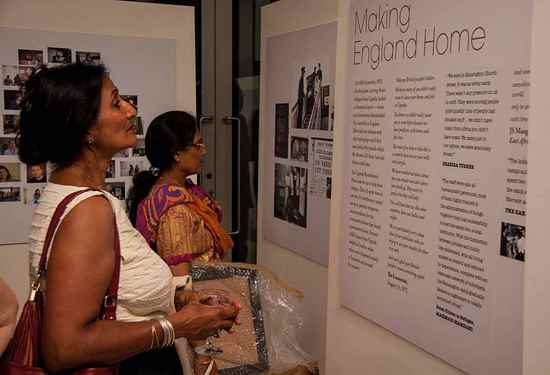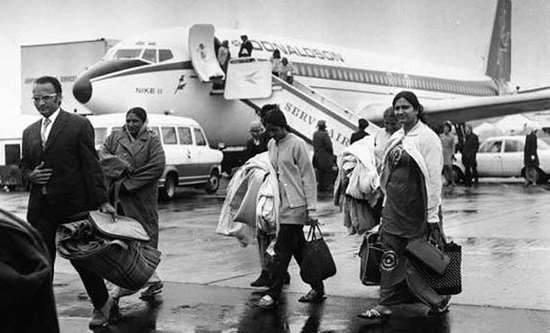It’s not over Ugandan Indians landing in London, 1972
LONDON: EXHIBITION
Goodbye Africa
There is an apocryphal story about an American tourist who, upon arrival in London, was greeted by a friendly taxi driver called Patel; then discovers that the hotel he was booked in was run by a Patel; the corner store was owned by a Patel; the pharmacy next door was managed by a Patel; and the money-changer across the road was a Patel. After he goes to a restaurant and realises half the staff was Patel, he shakes his head in disbelief and jokes: “Is the blooming queen a Patel too?”
That American tourist would probably have loved to see ‘Exiles: the Ugandan Asian Story’, an exhibition tracing the roots of Britain’s Ugandan Indians (the Patels, Shahs and Amins) who settled here after being expelled by Idi Amin in 1972, sparking one of the biggest waves of migration of Asians from east Africa.
Forty years later, they are a thriving community with a foot in every door and the biggest immigrant success story.(Editor's note - Similar to the Sindhis in post independence India.) But, as the exhibition tells us through personal testimonies, photographs, letters, newspaper reports and TV footage, it could have had a very different ending but for the sheer tenacity and enterprise of a people who, despite having lost everything, refused to accept defeat.
Being suddenly uprooted from their homeland and forced to make a home in an alien, cold, rain-sodden country was a traumatic experience. And memories of that nightmare still haunt them. Many retain vivid recollections of the day, August 4, 1972, that was to change their lives forever following Idi Amin’s dramatic radio broadcast: “I had a dream that if I expel all Asians with whatever passports they are holding, take away all their businesses, Uganda will prosper.”
Kirit Thakkar was 17 at the time. “It was two in the afternoon. I had come home from school and we had just finished our lunch when we heard it on the radio. It was a big shock...what would happen to our extended family? What would happen to the businesses we had built over the last 40-50 years? Apart from Uganda, we did not know any other country where we could make a permanent base for ourselves,” he says in a podcast recorded by the National Archives to mark the 40th anniversary of Amin’s expulsion of some 70,000 Indian-origin Asians.

That American tourist would probably have loved to see ‘Exiles: the Ugandan Asian Story’, an exhibition tracing the roots of Britain’s Ugandan Indians (the Patels, Shahs and Amins) who settled here after being expelled by Idi Amin in 1972, sparking one of the biggest waves of migration of Asians from east Africa.
Forty years later, they are a thriving community with a foot in every door and the biggest immigrant success story.(Editor's note - Similar to the Sindhis in post independence India.) But, as the exhibition tells us through personal testimonies, photographs, letters, newspaper reports and TV footage, it could have had a very different ending but for the sheer tenacity and enterprise of a people who, despite having lost everything, refused to accept defeat.
Being suddenly uprooted from their homeland and forced to make a home in an alien, cold, rain-sodden country was a traumatic experience. And memories of that nightmare still haunt them. Many retain vivid recollections of the day, August 4, 1972, that was to change their lives forever following Idi Amin’s dramatic radio broadcast: “I had a dream that if I expel all Asians with whatever passports they are holding, take away all their businesses, Uganda will prosper.”
Kirit Thakkar was 17 at the time. “It was two in the afternoon. I had come home from school and we had just finished our lunch when we heard it on the radio. It was a big shock...what would happen to our extended family? What would happen to the businesses we had built over the last 40-50 years? Apart from Uganda, we did not know any other country where we could make a permanent base for ourselves,” he says in a podcast recorded by the National Archives to mark the 40th anniversary of Amin’s expulsion of some 70,000 Indian-origin Asians.

|
An estimated 28,000 arrived in Britain, most with virtually nothing except the clothes on their bodies. They were given just 90 days to pack up and leave, and allowed to take the equivalent of only £50 out of the country. “You can call it a riches-to-rags story,” says Jyoti Patel, who was 13 when her world suddenly turned upside down. Her father was a well-to-do businessman, but had to leave everything behind. “We came with nothing. It was a cold, freezing night when we landed here. Most of us didn’t have warm clothes or even proper footwear. We came in chappals,” she told Outlook. They were put up in disused military barracks which had been converted into refugee camps. Many could not speak English, so it was hard to get around. “It was quite a culture shock. Everything was new. We had never eaten cornflakes before and didn’t know you were supposed to mix it with milk!” she says, recounting the initial adjustment process.
It took them some time to find their bearings, but once they did, there was no looking back. Soon, many of them gave up jobs to set up their own businesses. They bought homes, built temples and started their own newspapers, laying the foundations of a successful close-knit community which today is the envy of other immigrant groups. Many Ugandan Asians see the exodus as a blessing in disguise. An old lady thrown out by Amin in 1972 is said to have preserved a photograph of him as a mark of “gratitude”.
The exhibition is the culmination of the Council of Asian People’s year-long Exiles project. “It’s the story of ordinary people who experienced extraordinary trauma before starting a new life in the UK. It is a story that needs to be told before memories are lost forever,” says project coordinator Jayesh Amin.

No comments:
Post a Comment